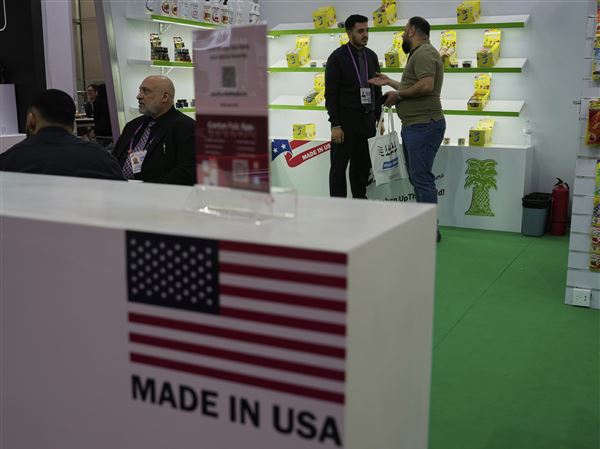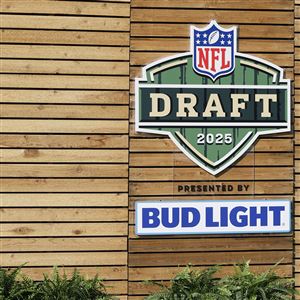
Brothers Chris, left, and Dan Brown celebrate after the family's baseball, autographed by Babe Ruth, sold at auction for more than $700,000 at Major League Baseball's All-Star FanFest yesterday. At center is their father, William Brown, whose father, Earl Brown, caught the Babe Ruth home run ball at the 1933 All-Star game.
Click photo for larger image.
William E. Brown put his head down as he heard the auctioneer announcing higher and higher six-figure bids for the baseball that had been in his family for 73 years, ever since Babe Ruth hit the first All-Star Game home run.
At that point, Mr. Brown was weeping.
The ball's value -- at least in the minds of two competing bidders -- sailed past $200,000 and kept soaring, with succeeding head nods in the Hunt Auctions section of Major League Baseball's FanFest at the David L. Lawrence Convention Center.
The El Paso, Texas, visitor's tears ended at the final $700,000 bid, reached in just a minute or two, for the ball his father claimed in the right field bleachers of Chicago's Comiskey Park in 1933. His father, Earl Brown, who died in 1965, was able to get Mr. Ruth to sign the ball two weeks after the game.
With Mr. Brown's wife in ailing health, the family figured it was time to cash in on the heirloom which has been sitting in three family generations of cedar chests and closets in Gary, Ind., El Paso and San Diego.
"We had no idea it would bring this much," said Mr. Brown, 68, who was accompanied by his two sons.
Factoring in Hunt Auctions' 15 percent commission fee charged to buyers, the bidder who did not want to be publicly identified paid $805,000 for the ball, the most expensive by far of some 600 items in the auction. The runner-up was also Ruthian, a 47-ounce bat the New York Yankees slugger used late in 1921 to hit one of the last of his then-record 59 home runs. The winning bid was $420,000, or $483,000 with commission.
About 100 people attended the auction, holding up numbered paddles occasionally to indicate their bids for a blank card autographed by Lou Gehrig ($2,800); a baseball signed by Jackie Robinson ($7,000); a signed Hank Aaron road jersey from the 1973 Atlanta Braves ($13,000); and one of the most impressive arrays of Pittsburgh Pirates souvenirs ever assembled, in the form of jerseys, photos, signed balls and bats and even 5-by-10-foot archway windows from Forbes Field ($8,650 for 10).
Denny Heindl, 65, a retired businessman and limited partner of the Pirates from Ridgway, Jefferson County, successfully bid $16,000 each for Bill Mazeroski's last glove and the first home run ball hit at PNC Park, by Sean Casey.
"I wanted to keep these in the Pirates family," said Mr. Heindl, who has been collecting memorabilia for 40 years.
Dan Means, owner of the Sports World Specialties shop Downtown, bought several items, including a billboard-sized photo of the 1960 Pirates that he's got no clue what he'll do with. He found that a bargain when bidding $2,700, but noted the heavy presence of Pittsburgh collectors inflated the prices of a lot of other Pirates memorabilia beyond what he deemed reasonable.
"People bid with their hearts, not their heads," he said, "and Pittsburgh collectors are very much into this, compared to other cities."
The Ruth bat was purchased through a telephoned bid by Gary Cypres, a Los Angeles businessman and sports memorabilia collector who said he intends to convert his extensive personal collection into a public museum.
"It's insanity, basically," Mr. Cypres acknowledged of the price, by phone interview afterward. "The levels that are being obtained were far beyond what anybody could have expected just a few years ago. ... Somebody else was willing to pay almost as much, so the comfort one takes is that you bought a very historical piece, a great piece, and hopefully someday if you have to sell it, you'll get your money out of it."
The bat belonged to Michael Pacheco, 31, of Roy, Utah, who received it as a treasured gift from a family friend 20 years ago when he and his parents lived in North Carolina. He said he was the third owner, and he's kept it "in a closet with a sock around it," never interested in showing it off.
"It was very sad to see it go," Mr. Pacheco said, "but it's the right time. It's going to take care of me and my family."
First Published: July 12, 2006, 4:00 a.m.














